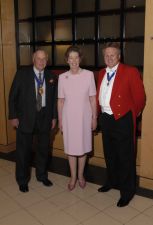Freemasonry is one of the world’s oldest fraternal societies. The lessons Freemasonry teaches in its ceremonies are to do with moral values (governing relations between people) and its acknowledgement, without in any way crossing the boundaries of religion that everything depends on the providence of God. Freemasons feel that these lessons apply just as much today as they did when it took its modern form at the turn of the 17th century.
Despite what many
people claim, Freemasonry is not in any way a secret society. Freemasonry’s
so-called secrets are solely used as a ceremonial way of demonstrating that one
is a Freemason when in Lodge meetings. In any case, they have been exposed by
the media for almost as long as Freemasonry has existed and are not important
information anyway. The real point of a Freemason promising not to reveal them
is basically a dramatic way of promising to keep one’s promises in
general.
Other reasons why Freemasonry cannot be called a secret society are
that Freemasons do not promise to keep their membership secret ( they can tell
anyone they wish ), where and when Freemasons meet are matters of public record
(you can look up Masonic centres in telephone directories) and our rule book,
the Book of Constitutions and our aims are readily available to anyone.
It is
ironic that because Freemasons used to be reticent about their membership
(because they were and still are taught never to use it to advance their own
interests), critics have taken this the wrong way round and think that there is
something secretive and nasty going on. Nothing could be further from the
truth.
Masonic ceremonies are secular morality plays which are learned by
heart by members of the lodge for the benefit of the person who is becoming a
Freemason or who wishes to explore Freemasonry further. Each ceremony has a
message for the candidate. A further reason why Freemasons do not go around
broadcasting their contents is simply because it would spoil it for the
candidate – exactly as in the same way you would not tell someone the ending of
a book or a film.
Under the English Constitution, basic Freemasonry is
divided into two parts, called the Craft and the Royal Arch. For Freemasons who
really want to explore the subject in more depth there is a host of other
ceremonies, which, for historical reasons, are not administered by the United
Grand Lodge of England.
All English Freemasons experience the three Craft (or
basic) ceremonies unless they drop out from Freemasonry very early on. These
three ceremonies (or degrees as we call them) look at the relations between
people, man’s natural equality and his dependence on others, the importance of
education and the rewards of labour, fidelity to a promise, contemplation of
inevitable death, and one’s duty to others. A fourth ceremony – the Royal Arch
emphasises man’s dependence on God.
Although all Freemasons are required to
profess and continue in a belief in a Supreme Being, and their ceremonies
include prayers, Freemasonry is not in any way a substitute for religion. It has
and can have no theological doctrines, it offers no sacraments, and it does not
claim to lead to salvation. By having prayers at its meetings Freemasonry is no
more in competition with religion than, say, having a meal at which grace is
said.
Furthermore, Freemasons are not allowed to discuss religion at
meetings. English Freemasonry is also strictly non-political and the discussion
of politics at masonic meetings is expressly forbidden. These rules both stem
from Freemasonry’s aims to encourage its members to discover what people from
all different backgrounds have in common. As is all too well known, debate about
religion and politics has all too often led, when allowed to run riot, to
discrimination, persecution and war.
A Freemason is thus basically encouraged
to do his duty first to his God (by whatever name he is known) through his faith
and religious practice, and then, without detriment to his family and those
dependent on him, to his neighbour through charity and service.
None of these
ideas is exclusive to Freemasonry, but all should be universally acceptable and
Freemasons are expected to follow them.
Thanks to Stephen Parkes of Round Table Lodge 8273, Wednesbury, West
Midlands. for permission to use this text

